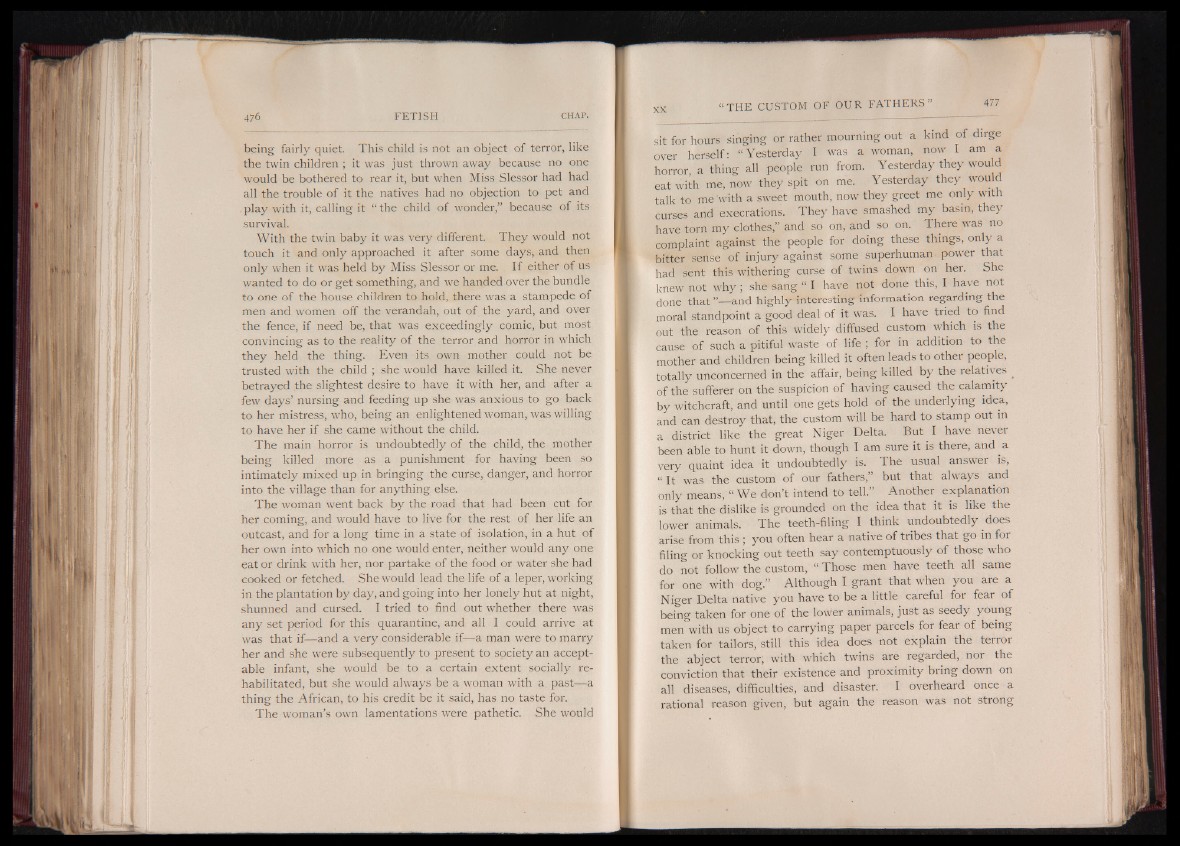
being fairly quiet. This child is not an object of terror, like
the twin children ; it was just thrown away because no one
would be bothered to rear it, but when Miss Slessor had had
all the trouble of it the natives had no objection to pet and
play with it, calling it “ the child of wonder,” because of its
survival.
With the twin baby it was very different. They would not
touch it and only approached it after some days-, and then
only when it was held by Miss Slessor or me. I f either of us
wanted to do or get something, and we handed over the bundle
to one of the house children to hold, there was a stampede of
men and women off the verandah, out of the yard, and over
the fence, if need be, that was exceedingly comic, but most
convincing as to the reality of the terror and horror in which
they held the thing. Even its own mother could not be
trusted with the child ; she would have killed it. She never
betrayed the slightest desire to have it with her, and after a
few days’ nursing and feeding up she was anxious to go back
to her mistress, who, being an enlightened woman, was willing
to have her if she came without the child.
The main horror is undoubtedly of the child, the mother
being killed more as a punishment for having been so
intimately mixed up in bringing the curse, danger, and horror
into the village than for anything else.
The woman went back by the road that had been cut for
her coming, and would have to live for the rest of her life an
outcast, and for a long time in a state of isolation, in a hut of
her own into which no one would enter, neither would any one
eat or drink with her, nor partake of the food or water she had
cooked or fetched. She would lead the life of a leper, working
in the plantation by day, and going into her lonely hut at night,
shunned and cursed. I tried to find out whether there was
any set period for this quarantine, and all I could arrive at
was that if—and a very considerable if-|§a man were to marry
her and she were subsequently to present to spciety an acceptable
infant, she would be to a certain extent socially rehabilitated,
but she would always be a woman with a past— a
thing the African, to his credit be it said, has no taste for.
The woman’s own lamentations were pathetic. She would
sit for hours singing or rather mourning out a kind of dirge
over herself: “ Yesterday I was a woman, now I am a
horror, a thing all people run from. Yesterday they would
eat with me, now they spit on me. Yesterday they would
talk to me with a sweet mouth, now they greet me only with
curses and execrations. They have smashed my basin, they
have torn my clothes,” and so on, and so on. There was no
complaint against the people for doing these things, only a
bitter sense of injury against some superhuman power that
had sent this withering curse of twins down on her. She
knew not w h y ; she sang “ I have not done this, I have not
done that”— and highly interesting information regarding the
moral standpoint a good deal of it was. I have tried to find
out the reason of this widely diffused custom which is the
cause of such a pitiful waste of life ; for in addition to the
mother and children being killed it often leads to other people,
totally unconcerned in the affair, being killed by the relatives ^
of the sufferer on the suspicion of having caused the calamity
by witchcraft, and until one gets hold of the underlying idea,
and can destroy that, the custom will be hard to stamp out in
a district like the great Niger Delta. But I have never
been able to hunt it down, though I am sure it is there, and a
very quaint idea it undoubtedly is. The usual answer is,
“ It was the custom of our fathers,” but that always and
only means, “We don’t intend to tell.” Another explanation
is that the dislike is grounded on the idea that it is like the
lower animals. The teeth-filing I think undoubtedly does
arise from this ; you often hear a native of tribes that go in for
filing or knocking out teeth say contemptuously of those who
do not follow the custom, “ Those men have teeth all same
for one with dog.” Although I grant that when you are a
Niger Delta native you have to be a little careful for fear of
being taken for one of the lower animals, just as seedy young
men with us object to carrying paper parcels for fear of being
taken for tailors, still this idea does not explain the terror
the abject terror; with which twins are regarded, nor the
conviction that their existence and proximity bring down on
all diseases, difficulties, and disaster. I overheard once a
rational reason given, but again the reason was not strong